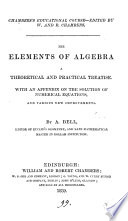 | Andrew Bell (writer on mathematics.) - 1839 - 500 pages
...other, and then divide the divisor by the remainder (86) ; then divide the last divisor by the last remainder ; and so on, till there be no remainder ; the last divisor is the greatest common measure. It is indifferent which of the quantities is made the first dividend, when the highest power of the... | |
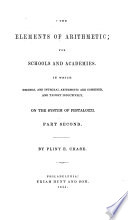 | Pliny Earle Chase - Arithmetic - 1844 - 246 pages
...remainder, the smaller number will be the greatest common dieisor. If there is a remainder, divide the first divisor by the first remainder, the second divisor by the second remainder, and so proceed until you obtain a quotient without a remainder. The last divisor will be the greatest common... | |
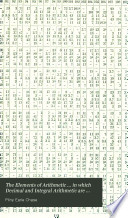 | Pliny Earle Chase - 1844 - 258 pages
...remainder, the smaller number will be the greatest common divisor. If there is a remainder, divide the first divisor by the first remainder, the second divisor by the second remainder, and so proceed until you obtain a quotient without a remainder. The last divisor will be the greatest common... | |
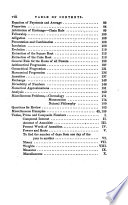 | Pliny Earle Chase - Arithmetic - 1848 - 244 pages
...remainder, the smaller number will be the greatest common divisor. If there is a remainder, divide the first divisor by the first remainder, the second divisor by the second remainder, and so proceed until you obtain a quotient without a remainder. The last divisor will be the greatest common... | |
 | James William M'Gauley - 1854 - 284 pages
...highest power is the same, in both) the dividend : and the other given quantity the divisor. Divide the first divisor, by the first remainder : the second divisor, by the second remainder : — and thus proceed, until there is no remainder. The last divisor will be the required greatest common measure.... | |
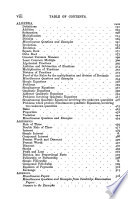 | Barnard Smith - 1857 - 740 pages
...if they be of the same degree, either of them by the other ; then the preceding divisor by the last remainder, and so on, till there be no remainder; the last divisor will be the Greatest Common Measure. If the terms of one of the expressions contain a factor which... | |
 | James Bates Thomson - Arithmetic - 1872 - 236 pages
...divisor. 1 <1. How f1nd the greatest common divisor of two or more numbers ? Divide the greater number by the less, the first divisor by the first remainder,...second divisor by the second remainder, and so on until the remainder is nothing; the h1st divisor will be the greatest common divisor. Or, writs the... | |
 | Francis Young (F.R.G.S.) - 1872 - 204 pages
...a remainder, bring down the former divisor, and divide it by the remainder, and so on continually, till there be no remainder ; the last divisor is the Greatest Common Measure. If the last divisor, by this process, be 1, the numbers have no common measure, and are prime to each... | |
 | H T. Sortwell - 1873 - 176 pages
...find the GCM of any two numbers — Step I. Divide the greater number by the less. Step II. Divide the first divisor by the first remainder, the second divisor by the second remainder, and so on till the division terminates. The last divisor is the GCM required. Example. Find the GCM of 1296 and 384.... | |
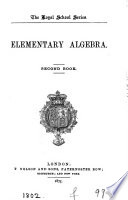 | James Martin (of the Wedgwood inst, Burslem.) - 1875 - 134 pages
...if they be of the same degree, either of them by the other; then the preceding divisor by the last remainder ; and so on, till there be no remainder: the last divisor will be the greatest common measure. If the terms of one of the expressions contain a factor which... | |
| |